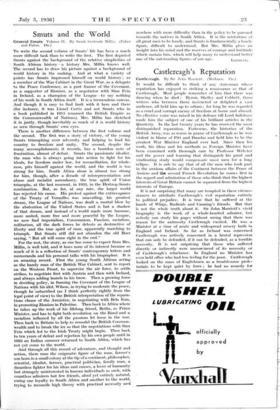Smuts and the World
To write the second volume of Smuts' life has been a much more difficult task than to write the first. The first depicted Smuts against the background of the relative simplicities of South African history—a history Mrs. Millin knows well. The second has to draw his picture against a background of world history in the making. And at what a variety of points has Smuts impressed himself on world history ; as a member of the War Cabinet in the Great War, as a delegate to the Peace Conference, as a part framer of the Covenant, as a supporter of Zionism, as a negotiator with Sinn Fein in Ireland, as a champion of the League—to say nothing of his work in South Africa itself. It is a tremendous canvas. And though it is easy to find fault with it here and there (for instance, it was Lionel Curtis and not Smuts who in a book published in 1915 renamed the British Empire as the Commonwealth of Nations), Mrs. Millin has sketched it in justly, though inevitably as much of it is world history as seen through Smuts' own eyes.
There is another difference between the first volume and the second. The first was a story of victory, of the young Smuts triumphing over adversity and helping to lead his country to freedom and unity. The second, despite the many accomplishments it records, has a bourdon note of frustration, almost of defeat. Smuts the passionate idealist, the man who is always going into action to fight for his ideals, for freedom under law, for reconciliation, for whole- ness, pits himself against the world, and the world is too strong for him. South Africa alone is almost too strong for him, though, after a decade of misrepresentation and abuse and racialist ascendancy, the true spirit of Union triumphs, at the last moment, in 1933, in the Hertzog-Smuts combination. But, so far, at any rate, the larger world has rejected his cause. His protest against the extravagance of the Treaty of Versailles was unavailing, his greatest dream, the League of Nations, was dealt a mortal blow by the abstention .of the United States and is but a shadow of that dream, and instead of a world made more humane, more united, more free and more peaceful by the League, we now find imperialism, Communism, Fascism, racialism, militarism, all the dark forces he detests as destructive of liberty and the true spirit of man, apparently marching to triumph. But Smuts still did not abandon the old Boer saying, " But all will come right in the end."
For the rest, the story, as one has come to expect from Mrs. Millin, is well told, and it loses none of its interest because so much of it is a reflection of Smuts' contemporary letters and memoranda and his personal talks with his biographer. It is an amazing record. First the young South African acting as the handy man of the British War Cabinet, sent to report on the Western Front, to supervise the air force, to settle strikes, to negotiate first with Austria and then with Ireland, and always adding laurels to his brow. Then a growing force in deciding policy, in framing the Covenant of the League of Nations with his idol, Wilson, in trying to moderate the peace, though he 'subscribed (as I think perfectly rightly from the legal point of view) to the British interpretation of the repara- tions clause of the Armistice, in negotiating with Bela Kun, in promoting Zionism in Palestine. Then back to Africa where he takes up the work of his lifelong, friend, Botha, as Prime Minister, and has to fight both revolution on the Rand and a racialism inflamed by all the passions let loose in the war. Then back to Britain to help to remodel the British Common- wealth and to break the ice so that the negotiations with Sinn Fein which led to the Irish Treaty might begin. Then back to ten years of defeat and rejection by his own people until in 1983 an Indian summer returned to South Africa, which has not yet come to the world.
And through all this record of adventure, and thought and action, there runs the enigmatic figure of the man, farmer's son born in a small colony at the tip of a continent, philosopher, scientist, idealist, farmer, practical politician, family man, a dauntless fighter for his ideas and causes, a lover of humanity but strangely uninterested in human individuals as such, with countless admirers but few friends, aloof yet entirely natural, owing one loyalty to South Africa and another to the world, trying to reconcile high theory with practical necessity and nowhere with more difficulty than in the policy to be pursued towards the natives in South Africa. It is the misfortune of all great men to be lonely, and Smuts is fundamentally a lonely figure, difficult to understand. But Mrs. Millin gives an insight into his mind and the reserves of courage and fortitude which sustain him, which will help many to understand better one of the outstanding figures of our age. LOTHIAN.














































 Previous page
Previous page